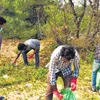This community of children is recycling plastic into eco-bricks to build benches for their slum community
Supported by SOS Children’s Villages of India, Bal Panchayat in Faridabad is innovating to clean up the neighbourhood.
Autopin, an urban slum near Faridabad, is plagued by several issues. Overcrowded with garbage strewn everywhere, the stench that rises from the drains makes the area almost unlivable. Over 4,000 homes are crammed into this Tilak Nagar slum where most of the residents are migrants who have come from the neighbouring states of Uttar Pradesh, Rajasthan, and even from Bihar.
Yet, despite all the challenges, the children of Autopin have decided that they need to make a change and have initiated a unique plastic recycling programme.
The children collect their own household plastic waste as well as ask their neighbours to separate the plastic from their waste, which is then collected each month. Inspired by their efforts, the whole community has started saving their plastic waste, which is later deposited at the work station of the community. Even the families of children who are not part of this initiative called the SOS Villages’ Bal Panchayat formed in 1964 are also giving their dry plastic waste to the Bal Panchayat members.
The plastic waste is then converted into Eco Bricks.

Children of the Bal Panchayat in the Autopin slum area with a plastic bench they created
The Eco Bricks project has been undertaken by a group of 30 odd children, who are part of Bal Panchayat, an initiative that empowers children from vulnerable communities. Supported by SOS Children’s Villages’ “Family Like Care” programme provides homes to children without families in one of its ‘Children’s Villages’, It is a community outreach model that works with vulnerable families (widows, single mothers, people below the poverty line, etc.) living in the vicinity of Children’s Villages. Its main aim is to prevent ‘at risk’ children from losing parental care, by boosting the family income through women empowerment, awareness generation, and capacity building.
Currently operating at a small scale, what sets it apart is that the entire initiative has been led by children who want to make a difference. There are around 30 children between the ages of 11 and 17 who are actively involved in the initiative.
A scalable solution
The children are taught how to create the bricks from scratch, starting from waste management to making the bricks, and assembling them to make the structures in the community. As they are all full-time students, they have to also manage their studies while being a part of the project.
The process of making the bricks involves collecting the dry plastic waste and segregating the bottles from them. The other kinds of plastic are cut into smaller pieces and pushed into the bottles till it’s full and weighs at least 500 gms. The filled bottle is capped tightly and can now be used as ‘bricks’. Eco bricks have been used to build benches for the community, but there are plans to use them in other community initiatives.
Nisha, a 15-year-old member of Bal Panchayat tells SocialStory, “We have always read about making efforts to keep the environment clean, but never made any effort to practically do anything. When we started planning for this project, we didn’t have much idea about waste management. After attending the training sessions, Bal Panchayat decided to work on the issue as plastic waste was one of the major concerns in our community.”
The Class X student at Government Girls Senior Secondary School, Sector 22, Faridabad says that while working on the project, she realised that things that seemed big and impossible in the beginning could actually be done fairly easily if executed properly.
Like Nisha, all the students in the Bal Panchayat attend school.
Speaking about this unique initiative, Sumanta Kar, Secretary-General, SOS Children’s Villages Of India, says, “In the Autopin community of SOS India, one of the major concerns is the disposal of plastic waste. With the help of the Eco Bricks project, the community is able to reduce the amount of plastic waste, which was previously being disposed of directly.”
He says that putting students in charge of the project helps them understand the responsibility towards the environment. Additionally, the eco-bricks are not sold but used entirely within the community.
“We try to make them realise that we have entrusted them with a work that we believe they can pull off,” Sumanta adds.
Saloni, a Class X student at the school says, “There was an excitement of creating something new. With the help of the community members, we were able to collect the waste. The project made me feel proud of myself as we weren’t doing it for our personal use but for our community. It is exciting to see the benches we make being used daily by the people in our community, and we have realised the importance of preserving nature."
A living legacy
For the last 56 years, SOS Children’s Villages of India has been protecting the best interests of children at the risk of losing one or both parents. It provides them with a loving home, helps keep their families together, and supports the youth on their path to self-reliance. Today, over 7,000 children live in 440 family homes inside 32 SOS Children’s Villages in 22 states/UTs, from Srinagar to Kochi, and Bhuj to Shillong.
As India’s largest self-implementing childcare NGO, SOS Children’s Villages directly touches the lives of around 25,000 children every year. The interventions range from short-term (of a few months) to long-term after-care programmes (till the children are 23 years old and self-reliant). These are carefully customised for each child to perfectly suit her or his needs.
Edited by Kanishk Singh







